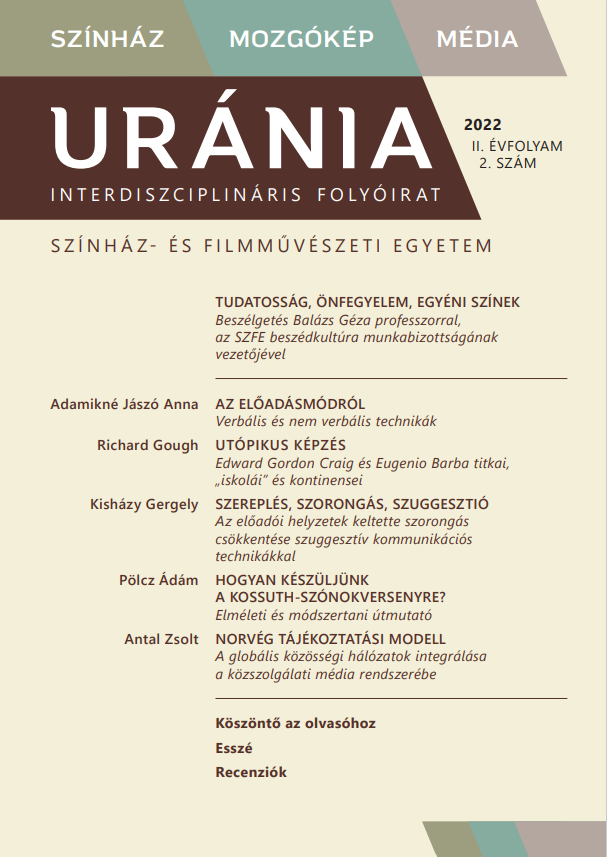Utópikus képzés
Edward Gordon Craig és Eugenio Barba titkai, „iskolái” és kontinensei
Absztrakt
A tanulmány Edward Gordon Craig és Eugenio Barba hatását vizsgálja a globális előadóművészeti színtéren. Életművük, filozófiájuk és pedagógiai megközelítéseik alapos vizsgálata révén feltárja művészeti örökségük rejtett kincseit. Az általuk alapított „iskolák” mint átalakító felfedezés és kreativitás birodalmai megközelítését tanulmányozva kiemeli utópikus vízióikat, melyek kultúrális határokon és kontinenseken átnyúlóak voltak. Az ő titkaik, ‚iskoláik,’ és világméretű hatásuk megismerése által hozzájárul a színház fejlődésének mélyebb megértéséhez, valamint örökségéhez.
Hivatkozások
Barba, Eugenio. 1995. The Paper Canoe: A Guide to Theatre Anthropology. London and New York: Routledge.
Barba, Eugenio. 1999. Land of Ashes and Diamonds: My Apprenticeship in Poland, followed by 26 Letters from Jerzy Grotowski to Eugenio Barba. Aberystwyth: Black Mountain Press.
Barba, Eugenio. 2015. The Moon Rises from the Ganges: My Journey through Asian Acting Techniques. Holstebro–Malta–Wroclaw–London–New York: Icarus.
Barba, Eugenio. 2021. „Dancing Questions.” Journal of Theatre Anthropology, 1: 7–11.
Barba, Eugenio, és Savarese, Nicola. 1991. A Dictionary of Theatre Anthropology: The Secret of the Performer. London and New York: Routledge.
Barba, Eugenio, és Savarese, Nicola. 2019. The Five Continents of Theatre: Facts and Legends about the Material Culture of the Actor. Leiden: Brill-Sense. https://doi.org/10.1163/9789004392939
Binyon, Laurence. 1913. „The Gordon Craig School for the Art of the Theatre: A Recognition of the Need for It.” The Mask, 5: 219–220.
Chemi, Tatiana. 2019. „Foreword: The Grammar of Magic and Science.” In The Five Continents of Theatre: Facts and Legends about the Material Culture of the Actor, szerzők: Eugenio Barba és Nicola Savarese, 1–5. Leiden: Brill-Sense.
Craig, Edward Gordon. 1910. „The Art of the Theatre; Second Dialogue.” The Mask, 2: 105–26.
Eliot, T. S. 1941. Burnt Norton. London: Faber.
Knowles, Rick. 2010. Theatre & Interculturalism. London: Red Globe Press. https://doi.org/10.1007/978-1-137-01424-5
Lees, Dorothy Neville. 1913. „About The Mask.” In Edward Gordon Craig (ed.) A Living Theatre: The Gordon Craig School, The Arena Goldoni, The Mask, Florence: The School for the Art of the Theatre, 11–31.
Lim, Jessica W. H. 2016. “And What Is the Use of a Book… Without Pictures or Conversations?”: The Text-Illustration Dynamic in Alice’s Adventures in Wonderland. Forum for World Literature Studies, 8: 385–405.
Marriott, Earnest. 1913. „The School at Florence.” In Edward Gordon Craig (ed.) A Living Theatre: The Gordon Craig School, The Arena Goldoni, The Mask, Florence: The School for the Art of the Theatre, 43–6.
Nicholson, John. 1913. „A Student’s Impression.” In Edward Gordon Craig (ed.) A Living Theatre: The Gordon Craig School, The Arena Goldoni, The Mask, Florence: The School for the Art of the Theatre, 46–8.
Rood, Arnold. 1983. „E. Gordon Craig, Director, School for the Art of the Theatre.” Theatre Research International, 8(1): 1–17. https://doi.org/10.1017/S0307883300006428
Savarese, Nicola. 2010. Eurasian Theatre: Drama and Performance between East and West from Classical Antiquity to the Present. Holstebro-Malta-Wroclaw: Icarus.
Savarese, Nicola. 2019. The Five Continents of Theatre: Facts and Legends about the Material Culture of the Actor. Leiden: Brill.
Semar, John. 1913. „Prelude.”The Mask, 5: 193–4.
Shevtsova, Maria. 2002. „Border, Barters, and Beads: In Search of Intercultural Arcadia.” In Ian Watson (ed.) Negotiating Cultures: Eugenio Barba and the Intercultural Debate, Manchester: Manchester University Press, 112–27.
Taxidou, Olga. 1998. The Mask: A Periodical Performance by Edward Gordon Craig. London and New York: Routledge.
Varley, Julia. 2021. „Starting a New Adventure.” Journal of Theatre Anthropology, 1: 13–17.




